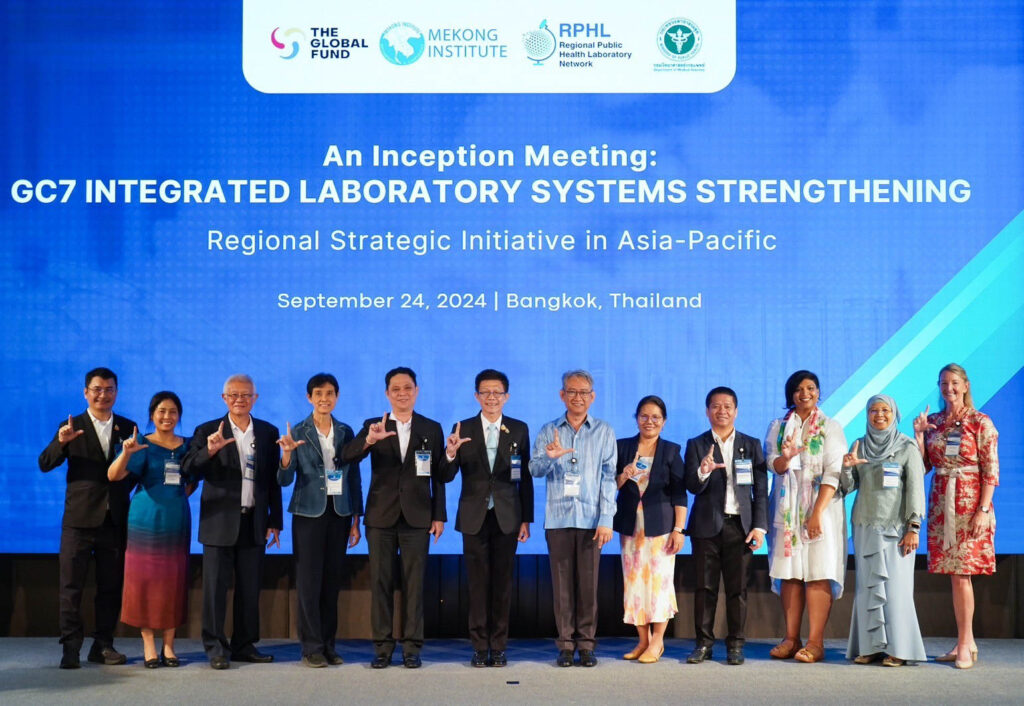Bangkok, Thailand, September 24, 2024 – To enhance national laboratory systems and foster cooperation across the 14 countries in Asia-Pacific, the Regional Public Health Laboratory (RPHL) Network, the Department of Medical Sciences (DMSc), Thailand’s Ministry of Public Health (MoPH), and Mekong Institute (MI), launched the kick-off Meeting for ‘Integrated Laboratory Systems Strengthening Strategic Initiative’, supported by the Global Fund.
With 14 member countries, including all 10 ASEAN member states plus Nepal, Pakistan, Papua New Guinea, and Timor-Leste, the RPHL Network was established in October 2019 under the Global Health Security Agenda (GHSA). It has since positioned itself as a key regional platform for collaboration and joint planning with members and key development partners, strengthening national laboratory systems toward regional and global health security.
Project activities are informed by a December 2022 Situational Assessment and a 5-year Work Plan (2023–2027) that focus on enhancing laboratory systems through three modules.
- Module 1: aims to build member countries’ capacities in key areas like National Laboratory Strategic Plans (NLSP), Quality Management Systems (QMS), Biosafety and Biosecurity (BSBS), and workforce development.
- Module 2: promotes regional collaboration, knowledge sharing, and technical assistance through RPHL Network website, discussion forum, and webinar to address timely diagnostic and detection of any emerging health threats.
- Module 3: dedicated to establishing a fully operational RPHL Network Secretariat, essential for governance structure, long-term sustainability and effective regional networking, with skilled personnel from various member countries.
Dr. Ballang Upapong, Deputy Director General, Department of Medical Sciences On behalf of The Permanent Secretary, Ministry of Public Health, Thailand, said that the Department is not only pleased to support the initiative but also proud to leverage technical assistance of the DMSC in advancing laboratory system across the region. “Effective laboratory systems are backbone for all nations to enhancing preparedness and timely detection of potential disease outbreaks. In addition to national efforts, a robust regional public health laboratory platform is essential for strengthening country-level capacities, delivering high-quality diagnostic, and promoting cross-country collaboration,” Dr. Ballang explained.
Mr. Nicolas Cantau, Regional Manager for South East Asia, Global Fund through his video recording, emphasized that the funded through the lab systems integration fund, reflects the Global Fund’s commitment to regionally owned and driven health solutions. It is expected to fostering information exchange and developing regionally tailored approaches to combat HIV, TB, malaria, and other diseases.
Ms. Jintana Sriwongsa, RPHL Network Advisor & Regional Program Director, emphasized the network’s pivotal role in connecting laboratory professionals, sharing critical information, and maximizing resources. The Global Fund support is timely to continue building blocks of the Network and will enhance RPHL Network member states’ capacity through targeted programs, improve region-specific guidance and best practices via an upgraded knowledge-sharing platform, and upskill the RPHL Network Secretariat to ensure sustainable resources and collaboration, positioning the network to effectively counter health threats before they escalate into pandemics.”
Mr. Suriyan Vichitlekan, MI’s Executive Director, expressed his enthusiasm for partnering with the RPHL Network on this groundbreaking project. “As an intergovernmental organization, MI is committed to leveraging our expertise on capacity development and regional cooperation to improve RPHL Network’s governance frameworks and operational systems. Through targeted dialogue, training programs, and systems development, we support this network in becoming a truly independent and self-sustaining regional leader in public health surveillance,” said Mr. Suriyan.
The event was attended by contact persons and lab experts from the RPHL Network, including representatives from Brunei Darussalam, Cambodia, Indonesia, Lao PDR, Malaysia, the Philippines, Pakistan, Papua New Guinea, Timor-Leste, and Thailand. Key development partners also participated, including The Global Fund, Foundation for Innovative New Diagnostics (FIND), Australian Centre for Disease Preparedness (ACDP), Global Health Security Agenda, USA, Chair of ASEAN Health Cluster 2, World Health Organization (WHO), Southeast Asia One Health University Network (SEAOHUN), United States Agency for International Development Regional Development Mission for Asia (USAID RDMA), World Organization for Animal Health, Clinton Health Access Initiative (CHAI), Deutsche Gesellschaft für Internationale Zusammenarbeit (GIZ), Thailand MOPH–TUC Coordinating Unit (TUC), Japan International Cooperation Agency (JICA), Chan Zuckerberg Biohub, National Institute of Animal Health, ASEAN Plus 3 FETN, Global Fund Country Coordinating Mechanism Thailand, and Integrated Quality Laboratory Services (IQLS).
The meeting was organized back-to-back with the NLSP Implementation Workshop on September 25-26, 2024, to share progress on their NLSP drafting, and discussed monitoring and evaluation frameworks, action plan implementation, and peer-to-peer support activities.
For more information, please contact:
Ms. Jintana Sriwongsa
RPHL Network Advisor & Regional Program Director
Email: [email protected]








